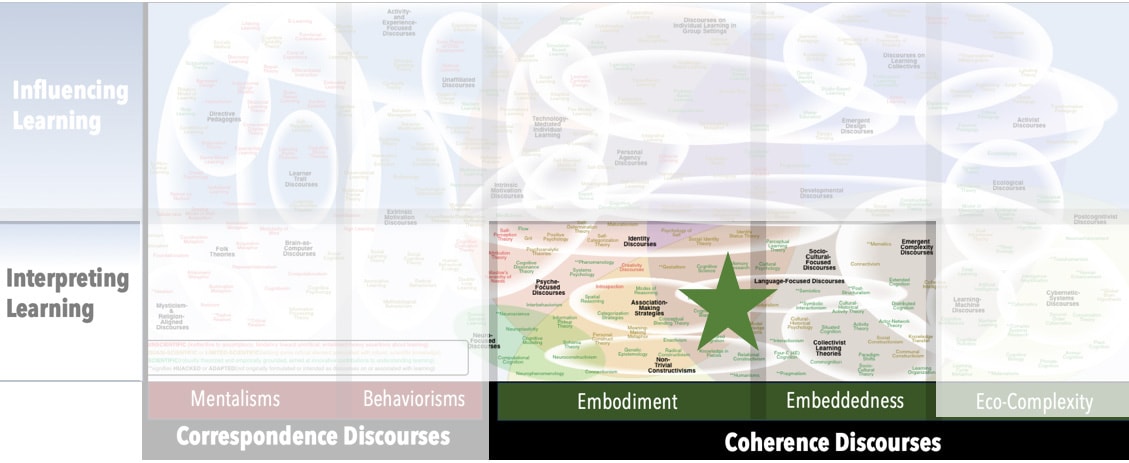Focus
Role of signs in personal, interpersonal, and cultural dynamicsPrincipal Metaphors
- Knowledge is ... current scope of meaningful signification
- Knowing is … using signs
- Learner is … a system of meaning (person, social, or cultural)
- Learning is … making meaning
- Teaching is … N/A
Originated
1990sSynopsis
Cognitive Semiotics is a theory of making meaning. Its unique contribution is to draw on and integrate varied insights and methods from both Semiotics and Cognitive Science. This blend entails analysis of how signs and symbols are involved in making meaning as well as experiment-based investigations, all aimed better understanding the role of signs in individual understandings, interpersonal communications, and cultural practices. Associated discourses include:- Edusemiotics (Educational Semiotics) (Andrew Stables, 2000s) – a frame in which learning is identified as co-extensive with living; both are construed as semiotic processes of creating meaning through responding to and interpreting signs. Formal education is thus interpreted as a co-option of learning (see Exaptation, under Universal Darwinism), whereby classical distinctions of knower–knowledge, mind–body, self–other, and so are reconceived as dynamic and co-constituting forms.
- Psychosemiotics (Gary Cronkhite, 1980s) – blending Psychology and Semiotics, the study of how one develops the ability to understand and use symbols and symbolic functions to communicate meaning
Commentary
Cognitive Semiotics does not appear to have attracted much critical attention, apart from a few notes of disdain from “purists” who question the wisdom of combining the insights and methods of different academic domains without first contrasting and interrogating their foundational assumptions.Authors and/or Prominent Influences
Thomas C. Daddesio; Juan Magariños de MorentinStatus as a Theory of Learning
In general, proponents of Cognitive Semiotics do not describe it as a theory of learning, but it has all the hallmarks of one. In particular, its foci on individual, collective, and cultural processes are precisely the topics addressed by most theories of learning.Status as a Theory of Teaching
Cognitive Semiotics is not a theory of teaching, and it offer no advice (direct or indirect) on influencing learning. (That said, see Semiotic Pedagogy.)Status as a Scientific Theory
Cognitive Semiotics appears to have a limited evidence base. However, it is bolstered by the rigor of the domains that it draws on.Subdiscourses:
- Edusemiotics (Educational Semiotics)
- Psychosemiotics
Map Location

Please cite this article as:
Davis, B., & Francis, K. (2024). “Cognitive Semiotics” in Discourses on Learning in Education. https://learningdiscourses.com.
⇦ Back to Map
⇦ Back to List
